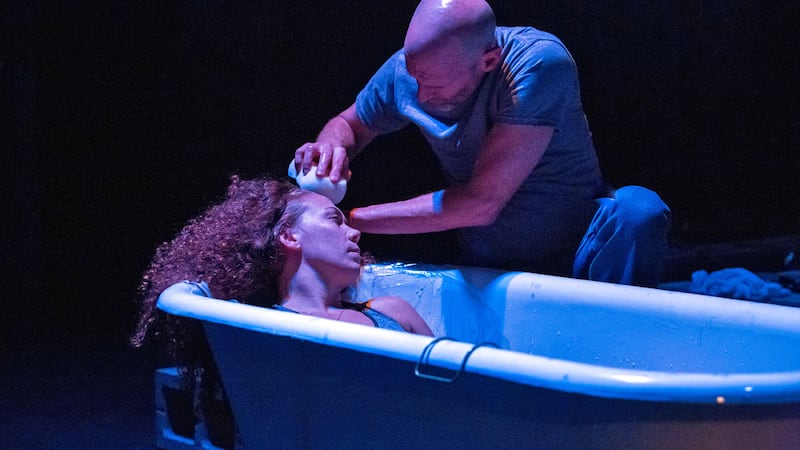In the first act of Water by the Spoonful, music professor Yaz (Crystal Ann Muñoz) gives a lecture on John Coltrane.
"Freedom is a word used to express chaos without spinning into it," she says.
Challenging what counts as freedom and what counts as chaos doesn't always sound pretty, which Yaz demonstrates by playing a few second of John Coltrane's screeching, arrhythmic Ascension.
"People don't like it when you break the rules," she says.
Water by the Spoonful is a play about a Puerto Rican-American family trying not to spin into chaos when rules and patterns have failed them. But since it's told with playwright Quiara Alegría Hudes's empathy, humor and gorgeous language, it's hardly a play about quiet desperation.
Yaz's cousin Elliot (Anthony Lam) is an Iraq War veteran in his early 20s who dreams of being an actor, but works at a sandwich shop and suffers from PTSD.
Yaz is going through a divorce ("You can only live in mediocrity for so long," she tells Elliot), and they're both planning a funeral for their aunt who raised Elliot.
Mixed in with their stories is that of Odessa (Julana Torres), a woman who moderates an online chat room for recovering and sober crack addicts.
Produced by Profile Theatre, Water is the second of three plays by Hudes that follow Elliot and his family. Profile is also staging the final play in the trilogy, The Happiest Song Plays Last, with an overlapping cast and a set that they convert after each show. It's the first time the plays have been simultaneously staged. Though Water and Happiest Song stand on their own, they build on each other so much that it seems a shame not to see both.
For Water, the set is an armchair and a clunky desktop computer on a platform made of cinder blocks and wood planks. It's there that Odessa runs the chatroom, while the other members (Bobby Bermea, Akari Anderson and Duffy Epstein) speak their typed messages from the theater's aisles. Odessa isn't just the moderator, she's the matriarch of the chatroom. She talks members out of relapsing, settles their arguments and offers empathy that few people can. "I used to have a beautiful family" she tells the chatroom members. "Now all I have is six years sober."
It's not until the second act that we learn Odessa's painful connection to Elliot and Yaz. But Torres (who was equally transcendent in 26 Miles, the last Hudes play that Profile staged) has spent the first half winning not only our respect, but also our admiration, so we're willing to see her side of even the darkest situations.
Still, it might be Yaz in the Happiest Song who most personifies the ability to find joy amid uncertainty. Most of Happiest Song is set in Yaz's home. The space around the platform has been transformed into her kitchen, where her policy is "open door, open store." Her stove is always stacked with pots of food she cooks for her neighbors, including a homeless man named Lefty (Duffy Epstein) who calls her mom. It's in her kitchen that we see her relationship unfold with her married neighbor Augustín (Jimmy Garcia). Their relationship isn't physical until he asks her to have a baby with him, and she agrees.
Meanwhile, Elliot is in Lebanon acting in his first movie. There, he befriends Ali (Wasim No'Mani), who fled from Iraq with his wife and daughter during the war. Elliot attempts to come to terms with his past in a literal way, too. For years, he's carried in his pocket the passport of the first person he killed in the war, a man who was an Iraqi civilian. Elliot hopes that Ali will help him return the passport to the man's widow and son.
Even though it's about Yaz falling in love and Elliot searching for resolution, Happiest Song isn't all happy. We learn something about Elliot that complicates his happy ending, like we do with Odessa in Water.
You don't leave either play believing time heals all wounds or that love guarantees forgiveness. In Water, Elliot shares his darkest moment of grieving his aunt's death with his older cousin. Instead of a resolution, Yaz offers "Plastic covered sofas to park our communal asses." At least for the moment, it's enough.
SEE IT: Artists Repertory Theatre, 1515 SW Morrison St., profiletheater.org. In rotating repertoire Wednesday-Sunday, through Nov. 19. $20-$36 per show.
